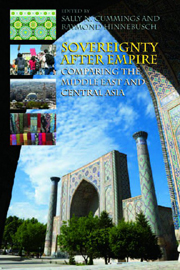Book contents
- Frontmatter
- Contents
- Acknowledgments
- Notes on the Contributors
- 1 Introduction
- SECTION I Histories of Empire and After
- SECTION II Paths to Sovereignty: Views from the Core and Periphery
- SECTION III Empire and Domestic Sovereignty
- 8 The Middle East after Empire: Sovereignty and Institutions
- 9 Sovereignty after Empire: The Colonial Roots of Central Asian Authoritarianism
- SECTION IV Empire and Popular Sovereignty
- SECTION V Empire and External Sovereignty
- Bibliography
- Index
8 - The Middle East after Empire: Sovereignty and Institutions
from SECTION III - Empire and Domestic Sovereignty
Published online by Cambridge University Press: 12 September 2012
- Frontmatter
- Contents
- Acknowledgments
- Notes on the Contributors
- 1 Introduction
- SECTION I Histories of Empire and After
- SECTION II Paths to Sovereignty: Views from the Core and Periphery
- SECTION III Empire and Domestic Sovereignty
- 8 The Middle East after Empire: Sovereignty and Institutions
- 9 Sovereignty after Empire: The Colonial Roots of Central Asian Authoritarianism
- SECTION IV Empire and Popular Sovereignty
- SECTION V Empire and External Sovereignty
- Bibliography
- Index
Summary
What has “empire” meant in a Middle Eastern context? And what is the link between the meaning and experience of empire and the post-imperial outcome of the sovereign state? From formal structures to more informal practices and understandings, the impact of imperialism has been extraordinarily pervasive across the region and remains so today, as evidenced by events in Iraq, Iran, neighboring Afghanistan and Israel–Palestine, and also by what might more loosely be called the mood on the “Arab street.” It has closely informed and conditioned the different aspects of state sovereignty as these have evolved and developed over the past century. This chapter explores the different, often contradictory, meanings of empire and sovereignty in the history of the modern Middle East and considers how they have interacted, positively and negatively, with the development of states and institutions. It is argued that the experience of Western imperialism and state-building interacted, often negatively, with pre-existing notions of sovereignty, leadership and modes of territorial, political and social organization, contributing – alongside other factors – to contested states and institutions. The introduction and maintenance of Western sovereignty models, but above all their qualified or bounded nature, have been a source of resistance and instability facilitating stubborn authoritarianism and continuing acts of external intervention.
Introduction
The concern of this chapter is to explore how an imperial past affects sovereignty outcomes, perceptions and choices, and the consequences for sovereignty of different imperial styles.
- Type
- Chapter
- Information
- Sovereignty after EmpireComparing the Middle East and Central Asia, pp. 157 - 177Publisher: Edinburgh University PressPrint publication year: 2011



